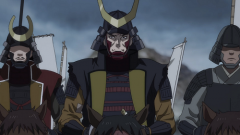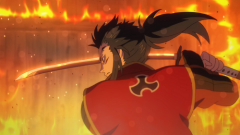Welcome one and all to the penultimate episode of Dororo. We have brutality, we have drama, and we have a boatload of philosophy. Its everyone Game of Thrones Season 8 said it would be, but wasn’t. Is it too late to make that joke? Regardless, this was a good week for Dororo, so let’s jump in.
Starting off, I was iffy on the production this week at first. Some of the opening scenes were… off, like Hyakki’s horse just panning down the screen. But as the episode went on this became less and less of an issue. With Hyakkimaru and Tahomaru just dominating the screen. This is everything I wanted from their final showdown. Sure, the road was long and meandering to get here, but visually it was a treat spanning 4 different scenes. From the fields, to the riverbanks, up to the castle to the current finale. I loved it all. Sure, the other side scenes weren’t fantastic from a production standpoint, but they had a lot of story value. Acting as a sort of break between sections of the fight, so we don’t get tired of swords clashing over and over. Simply put, Dororo looked great this week, the story striking to as well.
Story wise there are a few things to talk about, once again starting with the fight. I enjoyed how Dororo portrayed both sides in this conflict. Showing the demonic influence in both, making it clear that neither was in the right. In particular, I found Hyogo and Mutsu’s ends to be delightfully brutal. They both accomplished something in the fight, defeating the horse, and managed not to take away from the brothers. Dororo even surprised me with how it used their demonic influence. Having their given arms move and strike even after death. Dororo portrayed this in a very unnatural way with the animation, the bodies being like ragdolls, with only the arms moving. It was so unexpectedly brutal that it reminds me of Mio’s fate early on, hearkening back to the first cour I enjoyed so much. None of this is even mentioning the fight between the brothers either.
Their conflict was the clear centerpiece of the episode, with details strewn throughout. Just to name a few, only Tahomaru’s human eye cried at his companions deaths. Meanwhile Hyakki grabs his blades by the blades, as that is how he has always used them. The use of the river-bank for obscuring vision. Meanwhile my personal favorite is Tahomaru’s tactical use of terrain and Hyakki’s new arms. Noticing how the new arms are longer than what he had before, and how that effects Hyakki’s fighting style. Moving to a new location more advantageous to him and taking advantage of this increased reach that Hyakki is still learning to use. Some of this was told to the viewer explicitly while other aspects were left for us to find. All in all, it is my favorite set of scenes in the series. Beaten out only by Mio’s fate earlier on.
None of this is mentioning the thematic aspect to all of this. Dororo may have spelt it all out for us explicitly between the brothers fight, but oddly enough it worked. I suspect its because of Biwa, the monk I have disparaged for so long. He has always been a passive observer to the story, causing him to feel useless in other aspects. Yet for this particular scene, this observer style character is very useful. These insights don’t feel out of place from him. I also enjoyed how Dororo admonished both extremes, not condoning one side over the other. Taking shots at Nui/Junkai’s empty lives of purity and Tahomaru/Hyakkimaru’s bloodstained lives conflict. Demonstrating the costs and in-feasibility of both. I am sure some moaned at the exposition, and I did a little as well. But Biwa’s purpose in the story became clear here, and I can accept that.
To expand on all of this, reddit user zz2000 wrote an interesting post here about how this connects to Buddha. To summarize in case you can’t/won’t check his post out, here it is in my words. Basically, Dororo is a discussion, a commentary, on Buddhist salvation and the practicality thereof. How our human desires and attachments lead and cause suffering in the mortal world and letting go of those leads to salvation. Dororo critiques this in the characters of Nui and Junkai, and how unsatisfactory their lives are, how little they have actually done. Meanwhile Dororo doesn’t let the other end off the hook either, the submission to those desires, in the characters of Tahomaru and Hyakkimaru. Those who failed to realize or find a balance to the Buddhist ideals and who are tragic characters because of this. Made more so by how Buddha saved Hyakkimaru’s life initially.
Speaking of tragedy, this ending is really shaping up to be my kind of story. Dororo seems to be leaning towards Hyakki surviving and learning a lesson from all of this. With the metaphore for the mother horse dying and the foal crying for it. Junkai arriving at the end, whom Hyakkimaru called mother, seeming prepared to die for Hyakki and Nui for Tahomaru. Personally I hope for more of a tragedy than this. With one of the brothers dying and Hyakki regaining his eyes, his moment of triumph soured by his first sight being a dying Junkai. However if done well, I think I could accept both of the brothers surviving and going their own way. The respective parents dying to give them a new start. Allowing Tahomaru to build up their lands from scratch, without demonic intervention. We shall have to see, but Dororo’s finale is setup well.
So all in all, how was the episode? Good. Really good, in my opinion. It’s the kind of ending I was hoping for from the beginning of the series. Hoping that Dororo would pull out, even in the face of its mid-season crash. I love that we are going to get a complete story here, wrapped up in full. Instead of having to wait in sequel hell for a conclusion that will never come. With how important endings are to me, as the final taste of a series, this is incredibly welcoming. Dororo has everything setup for a satisfying ending, excluding Daigo’s apparent exit from the story. So long as it can land it, I will be happy. The series has a lot of flaws, but I will happy.







